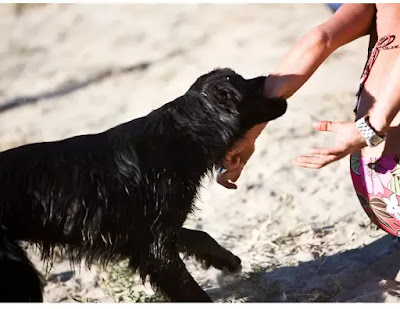How to prevent dog bite?
Introduction
If
you're a dog owner, then you know that your pet can be a loving companion. But
it's also true that some dogs are more aggressive than others. If your dog
bites someone, there will be consequences—even if it's just an accident! In
this article we'll explore some ways to prevent your pet from biting someone:
Don't run past a dog.
While
running past a dog is not recommended, it's important to note that your dog may
not be able to tell the difference between you and another person running by.
Dogs
are territorial animals, so if they see someone trespassing on their territory,
they will naturally feel threatened and attempt to protect themselves by
chasing after them. In this case, your best bet is usually just leaving the
area immediately (or at least slowly). However, if you're in an area where
there are no other people around or any buildings nearby which could provide
cover from sightseeing eyes—and especially if there's a fence between yourself
and the dog—it might be wise for you not too run past these dogs as well!
If
you believe a dog is about to attack you, try to place something between
yourself and the dog, such as a backpack or a bicycle.
- If you believe a dog is about
to attack you, try to place something between yourself and the dog, such
as a backpack or a bicycle.
- Don't run away from the
situation. Do not turn your back on the dog and do not scream.
- Crouch down low with hands up
in front of your face because this will make it harder for dogs to see you
as an easy target for their teeth or claws.
- Don't make eye contact with
them either; this can be seen as threatening behavior that triggers
aggression in some dogs (especially young ones).
Avoid direct eye contact with a dog.
When
a dog is looking at you, it is a sign of dominance. This can be intimidating to
the dog, who may take it as an invitation to stand up for himself and attack
you. To avoid this, always look at the dog's nose rather than directly in its
eyes or mouth. If possible, try to stand with your back against something that
will give you more balance (like a wall) so that if the dog approaches too
quickly and lunges forward, there's nothing between him and you but air!
Do not disturb a dog who is sleeping, eating, or caring for puppies.
Do
not disturb a dog who is sleeping, eating or caring for puppies.
Dogs
have a natural instinct to protect their young and will become aggressive if
they sense that you are dangerous. If a dog has young pups at home and you
approach it while it is nursing them, the mother may feel threatened by your
approach and attack you instead of protecting her babies. Never touch or
attempt to pet a sleeping or resting dog unless it invites you over with calm
signals; this includes feeding time as well!
Do
not take food away from an adult dog unless it asks for it directly. The same
goes for treats: never force-feed any type of treat onto another animal because
this can cause them stress if they don't like what's going on around them (and
possibly even aggression).
Remain motionless when approached by an unknown dog.
If
you are attacked by an unknown dog, curl into a ball and protect your face and
neck. Do not run away as this may encourage the dog to chase you. If there is
no danger of being bitten, stand still until help arrives or the animal leaves
or goes away on its own accord.
If
a dangerous dog is attacking you or someone else:
- Do not run away because this
encourages dogs to attack again and again; instead, remain motionless
until help arrives
Do not approach an unfamiliar dog and always allow it to see and sniff you before petting the animal.
When
you approach an unfamiliar dog, its sense of smell is 10,000 times more
powerful than yours. Dogs can smell fear, nervousness and anger in humans. If
you want to avoid being bitten by your pet, always allow it to see and sniff
you before petting the animal.
Be patient and calm around dogs, and they won't bite!
Dogs
are not naturally aggressive. They bite when they feel threatened, and that is
all. If you can show your dog that you're not afraid of him, then he will stop
trying to attack you.
First
of all, it's important to remember that dogs don't bite because they're mean;
they bite because they feel threatened! If a dog feels threatened and has no
other way to protect himself or his family from harm (for example if someone is
trespassing on their land), then the only thing left for him is to protect
himself by biting someone who might hurt them (or those close by).
Conclusion
In
conclusion, your dog and you should always be on the same page. If you know how
to play around with your puppy and give them the attention they deserve, then
they will be better behaved and less likely to bite. You can start by giving
treats every time he doesn't bite anyone!

Comments
Post a Comment